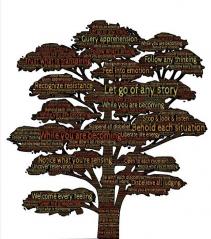The New Year is a time for resolutions, fresh starts, and hope for a better future. How many parents have said to themselves, “I want to be a better parent, but how?” Here are some ideas for how to put hope and good intentions into practice.
1. Be sincere. Be a role model for your children on how to be honest with your emotions. Children can tell when you really don’t mean it.
2. Always look for what each of your children is best at, and recognize his special strengths and show appreciation. Respect your children’s limits; don’t ask for more than they are capable of.
3. Each child is different, recognize each child’s nature and respond appropriately.
4. Boundaries provide security. Be consistent so that your children can show the courage to explore their limits while also feeling safe and comfortable that they won’t become embarrassed or get hurt.
Author: Barbara Flanderson
New Cancer-Detecting Technology
A new cancer-detecting method is currently being developed, in a study conducted by Veridex, Johnson & Johnson and Massachusetts General Hospital. The new blood test uses CTC (circulating tumor cell) technology to capture, count and identify tumor cells which circulate in a patient’s bloodstream. These cells are found at very low levels.
 “This new technology has the potential to facilitate an easy-to-administer, non-invasive blood test that would allow us to count tumor cells, and to characterize the biology of the cells,” explained Robert McCormack of Veridex in a press release issued by Johnson & Johnson. “Harnessing the information contained in these cells in an in vitro clinical setting could enable tools to help select treatment and monitor how patients are responding.”
“This new technology has the potential to facilitate an easy-to-administer, non-invasive blood test that would allow us to count tumor cells, and to characterize the biology of the cells,” explained Robert McCormack of Veridex in a press release issued by Johnson & Johnson. “Harnessing the information contained in these cells in an in vitro clinical setting could enable tools to help select treatment and monitor how patients are responding.”
Today, patients must undergo painful biopsies in order to be diagnosed. The samples do not determine the correct treatment for the patient, and many experimental treatments are administered in order to identify which is the most effective. The process is often very slow and many patients do not survive the wait. If the new research is successful, the CTC technology will enable doctors to provide an immediate, more accurate diagnosis, as well as more personalized treatments for the patients.
“Mindfulness Meditation” Part II
 Dr. Florian Ruths believes that when Mindfulness Meditation is practiced properly, in a clinical setting, it can benefit the practitioners in three ways.
Dr. Florian Ruths believes that when Mindfulness Meditation is practiced properly, in a clinical setting, it can benefit the practitioners in three ways.
First, “it teaches us to immerse ourselves deeper in the present rather than worry about things we can’t control in the future- will I have a job? Will I be ok in five years’ time?- or dwell on something in the past that we can’t handle either,” he says.
Second, he explains that it “teaches us something about the validity of thoughts and emotions. When we are in a difficult state we believe several things: it will never end, it says something about us being flawed, and we need to get out of it now. Mindfulness helps us see that emotions change and that if I have a though, it is not necessarily the reality, it is just a thought.”
Third, “mindfulness is an act of kindness, of compassion. It teaches us about directing the capacity for compassion that we all have at ourselves. That in itself is something new.”
“Mindfulness Meditation” Part I
Some of Hollywood’s biggest stars are supporters of a form of meditation called “Mindfulness Meditation.” The technique is becoming more and more popular, and, as evidence of its effectiveness becomes more obvious, researchers and psychologists are starting to believe in it too. Actresses like Meg Ryan and  Goldie Hawn acts as advocates for the meditation method. They explain that the technique uses ancient Buddhist principals to combat mental suffering, and encourages the practitioners to slow down, “inhabit the moment” and become more accepting of their feelings. Ryan says that “by simply refocusing our awareness, we reshape our experience.”
Goldie Hawn acts as advocates for the meditation method. They explain that the technique uses ancient Buddhist principals to combat mental suffering, and encourages the practitioners to slow down, “inhabit the moment” and become more accepting of their feelings. Ryan says that “by simply refocusing our awareness, we reshape our experience.”
The meditation was first regarded with skepticism by most psychologists, but the practice has earned a lot of respect due to research which indicates its clinical effectiveness. Some experts are being cautious about overselling the benefits of the practice, however. Florian Ruths, who runs a mindfulness meditation program in London, explains that he thinks “we need to be cautious. At the moment the enthusiasm is much higher than the evidence. Those who practice mindfulness meditation know it makes a huge difference to people’s lives. But there is a danger of saying it works in psychology so why not use it for almost anything in life? And suddenly having a bit of pleasure, or seeing something beautiful, becomes an act of mindfulness. We need to be careful that we don’t create an impression that we’ve got something proven to be effective for almost everything when we haven’t actually done the scientific work.”
New Technology Can Identify Biomarkers in Breath
 The identification of ‘biomarkers,’ chemical compounds which are found in our bodies, may now be possible following a recent discover of Purdue University. Researchers have developed a breath-analysis technology which is at least one hundred times better than those used previously. The new technology is able to detect biomarkers in the parts per billion to parts per million range, which is much faster than previous techniques.
The identification of ‘biomarkers,’ chemical compounds which are found in our bodies, may now be possible following a recent discover of Purdue University. Researchers have developed a breath-analysis technology which is at least one hundred times better than those used previously. The new technology is able to detect biomarkers in the parts per billion to parts per million range, which is much faster than previous techniques.
“We are talking about creating an inexpensive, rapid way of collecting diagnostic information about a patient. It might say ‘there is a certain percentage that you are metabolizing a specific compound indicative of this type of cancer,’ and then additional, more complex tests could be conducted to confirm the diagnosis,” explained Carlos Martinez, an assistant professor at Purdue.
